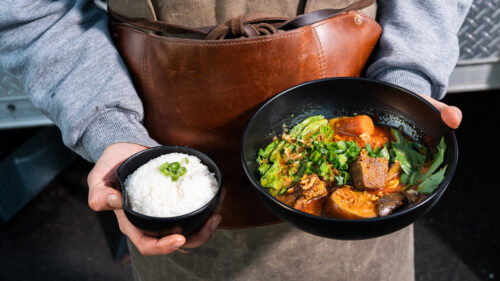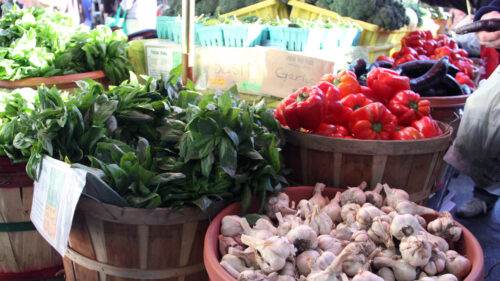As a vegetable lover and food enthusiast, I jumped at the opportunity to get my rain boots in the mud and visit a few farms with Growing Gardens, a Portland-based nonprofit that helps cultivate access to culturally appropriate and healthy, sustainable food. Volunteer events and the Chef in Your Garden series highlighting local chefs and farms are a couple ways to get involved. As the farmers shared their stories, I found a deeper appreciation for Oregon produce, especially when you consider the challenges that farmers have faced in recent years.
Here are five farms across the greater Portland area that tell a unique story about cultural heritage and community — and ways you can support them.
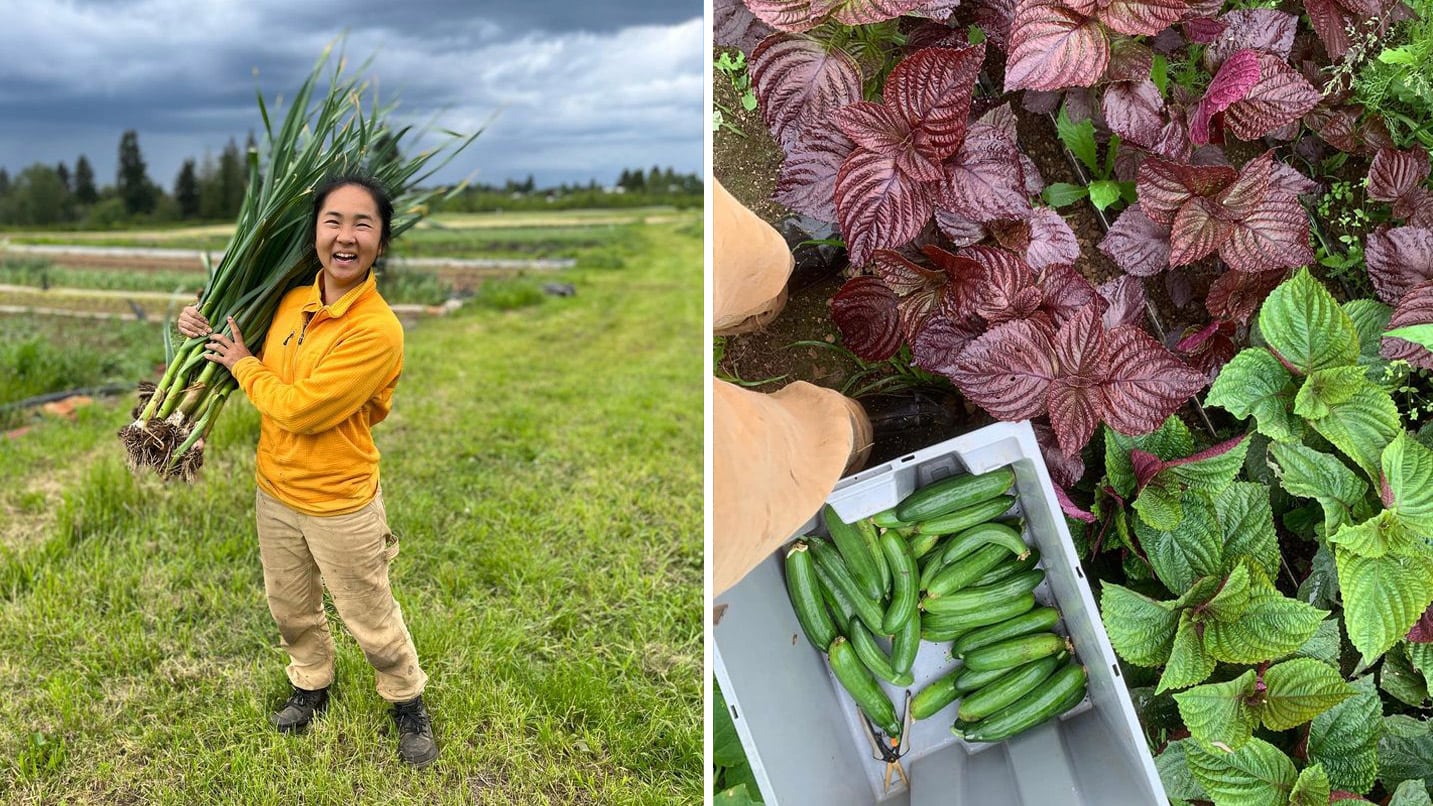
Asian Heritage Vegetables in Gresham
Catherine Nguyen, the solo farmer behind Mora Mora Farm — which means “slowly, slowly” — believes slowing down is the key to living well. Nguyen originally intended to become a physical therapist, but she had a revelation while volunteering on a farm: “It was the first time I felt like I could slow down. My thinking was crystal clear while still doing something with my body,” she says. In 2018 she launched Mora Mora through the Headwaters Incubator Program in Gresham.
The anti-Asian sentiment brought on by the pandemic prompted a new wave of support for Asian growers and increased demand for Asian heritage crops, like bok choy, peppers, eggplant and bitter melon. Enjoy these vegetables through Mora Mora’s Community Supported Agriculture farm-produce subscription box, and find them at Rocky Butte Farmers Market and Portland restaurants like Matta and Street Disco.
Vegetables were not always a big part of Nguyen’s life. She recalls a more Euro-centric diet growing up, rather than meals rooted in Vietnamese cooking. However, through food, Nguyen is tapping back into childhood flavor memories and reconnecting with her racial identity and family history at eateries like Matta. “The combination of Vietnamese flavors with fast-food cuisine is nostalgic in terms of both flavor and texture,” she says. Matta chef Richard Van Le sources ingredients from Nguyen — the only Vietnamese woman farmer he knows — like purple perilla, Thai basil and red daikon for his food cart.
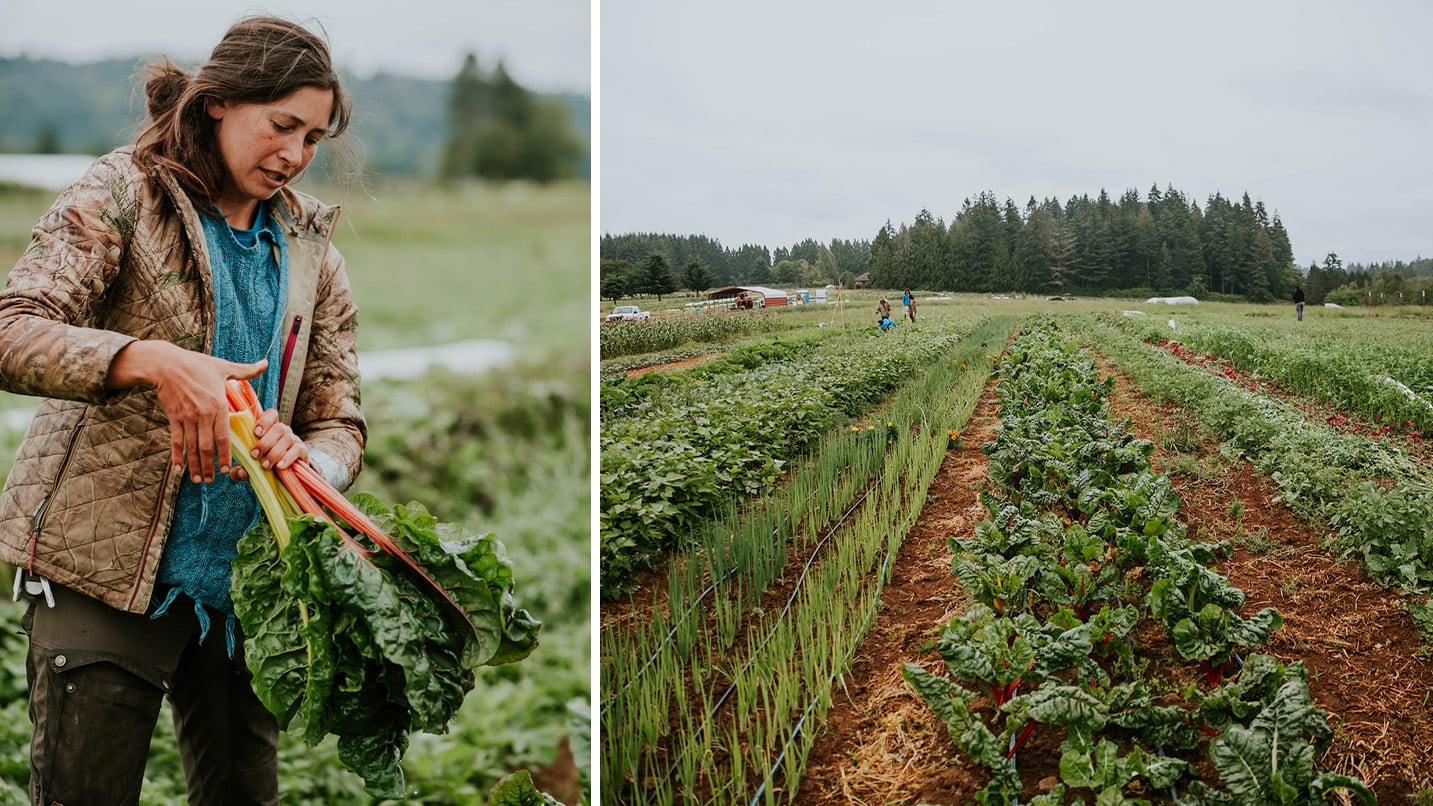
Revitalizing Native First Foods and Knowledge
Led by Native owner and operator Michelle Week, x̌ast sq̓it (hast squeit) Farm translates to “good rain” in the traditional language of the sngaytskstx (Sinixt) Arrow Lakes People.
Specializing in Native first foods, Good Rain Farm east of Portland centers on building and sustaining food sovereignty — the politics of who defines what is a food versus a weed or ornamental plant. Take lamb’s quarters, for example: This leafy green in the amaranth family, not all that different from spinach, is often listed as a noxious weed or only as wild-foraged food, not a common crop for human consumption. The farm hopes to decolonize and reframe those notions.
In the CSA in spring, you’ll find crops usually available only to Oregon foragers — think miner’s lettuce, lamb’s quarters and thimbleberry. To make nutritious food more accessible, the farm offers over half its produce at low cost through scholarships, sliding-scale pricing, SNAP and EBT. In addition to posting sustainable agriculture events and providing farm internships, Good Rain serves the community with its Save Our Seed program to reclaim and revitalize Indigenous foods and knowledge.
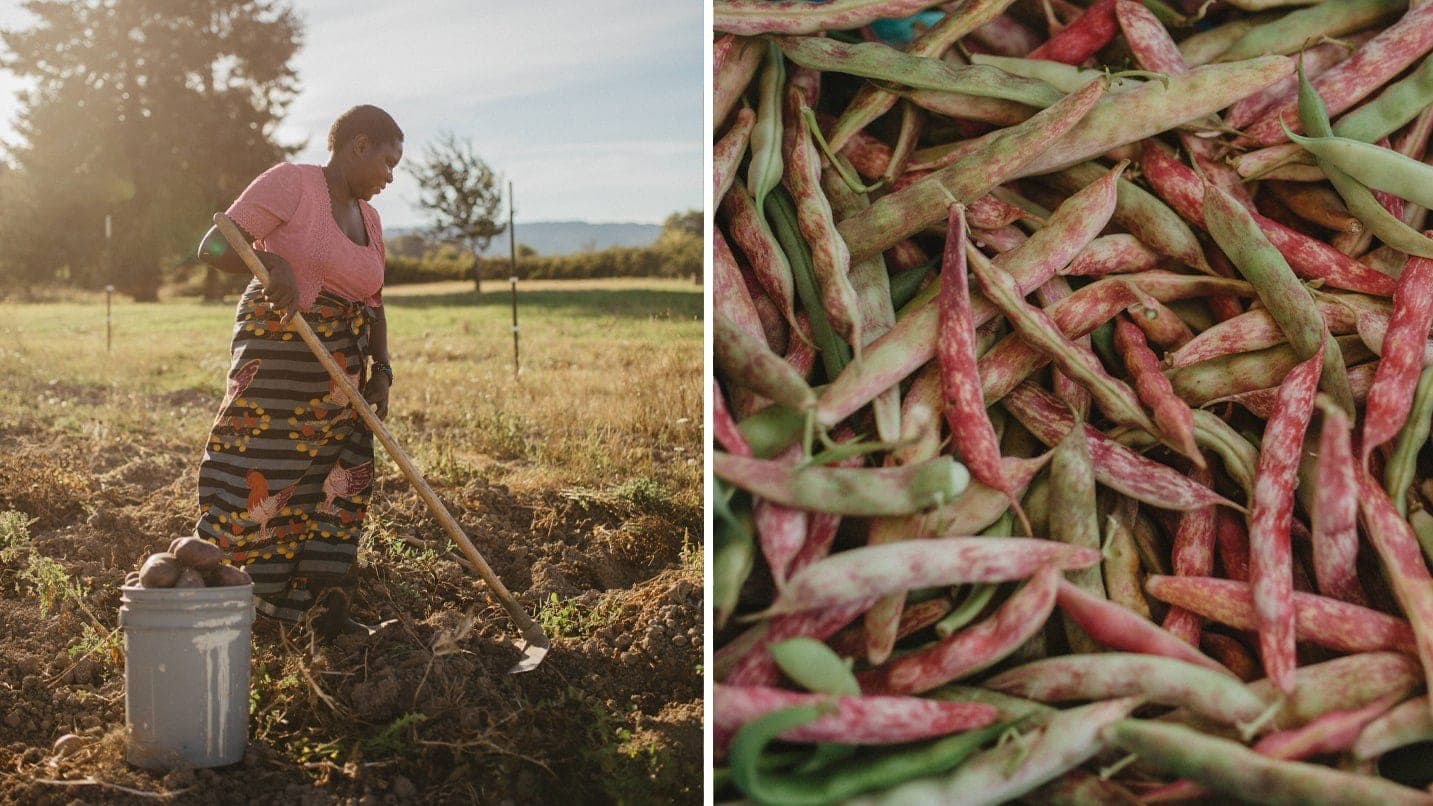
A Family Farm Growing African Vegetables
For Japhety Ngabireyimana and his family, farming is what brings them joy — hence the name Happiness Family Farm. Sharing African foods is more than the family’s livelihood: “Food is a way for people to really connect with home,” Ngabireyimana says.
Originally from Burundi in East Africa, the family lived in Tanzanian refugee camps before immigrating to Beaverton, where they felt disconnected from their new environment. Ngabireyimana’s parents, Rosata Niyonzima and Prosper Hezumuryano, who had been farming since childhood, worked low-wage jobs that made it challenging to support the family of nine.
Today part of the family farm is located on Sauvie Island. You can support Happiness Family Farm through the CSA and seasonal farmers markets in Portland, like the Come Thru market — an incubator focusing on Black and Indigenous farmers — and those at St. Johns, Kenton and PSU.
Niyonzima and Hezumuryano source seeds from Africa to grow herbs and vegetables that they and other African immigrants miss from their homeland. Portland restaurant Akadi chef Fatou Ouattara featured African eggplant, one of the farm’s specialties, in a stew with locust beans and plantain fufu for a Growing Gardens Chef in Your Garden dinner in 2022. On the farm’s Instagram page you’ll find recipes to learn how to cook African vegetables like amaranth greens and zucchini leaves.
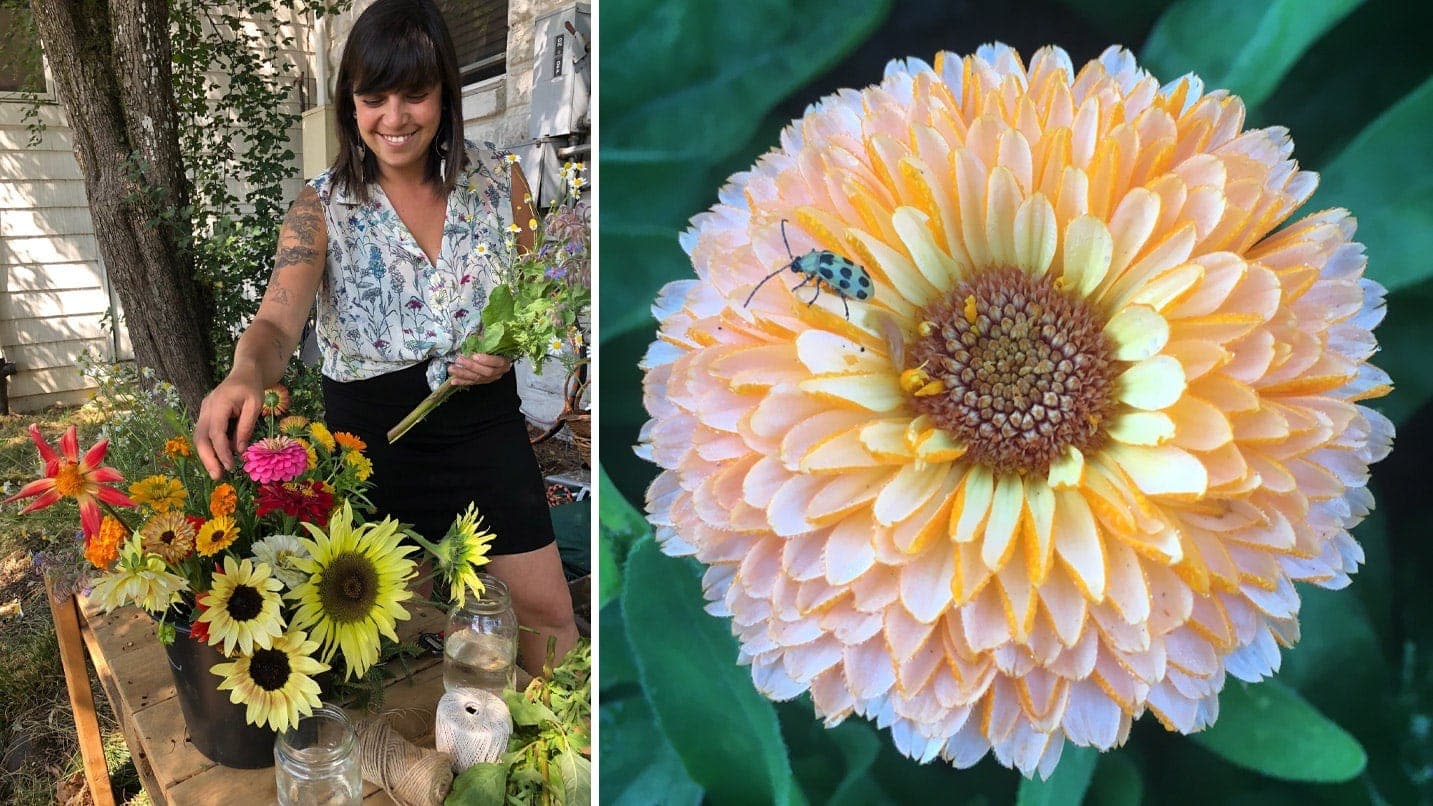
Traditional Latin Herbal Remedies and Medicinal Bouquets
Flynne Olivarez views the mighty mariquita — “ladybug” in Spanish — as a symbol of strength and resilience, referring to the way the beetles emerge from the soil. Growing up, she didn’t have much connection to plant medicine. Olivarez now understands her grandmother’s homemade treatments as herbal folk remedies — a part of her Latinx heritage she wants to share.
Mariquita Medicinals specializes in herbs and flowers that support the nervous system and help regulate stress, depression and anxiety. For example, Olivarez collects passionflower for calming effects, elderberry for immune-boosting qualities, and rosemary to support circulation and improve cognitive abilities. You can shop online and at Come Thru market in Portland.
Additionally, Mariquita Medicinals offers a bouquet CSA. Wrapped in twine, the flowers and herbs come with informational cards featuring botanical drawings and home-remedy recipes. The farm offers volunteer days and classes to share how valuable it is to have a relationship with plants.
Beyond farm work, Olivarez volunteers with projects like PDX Free Fridge and the farm is part of the Mudbone Grown farming program. She contributes apothecary products to create care packages for activists via Seagrape Apothecary, Snack Bloc and Red House on Mississippi. In the past, Olivarez has shared herbal steam packs — like those she makes to care for herself — with communities affected by wildfire smoke.
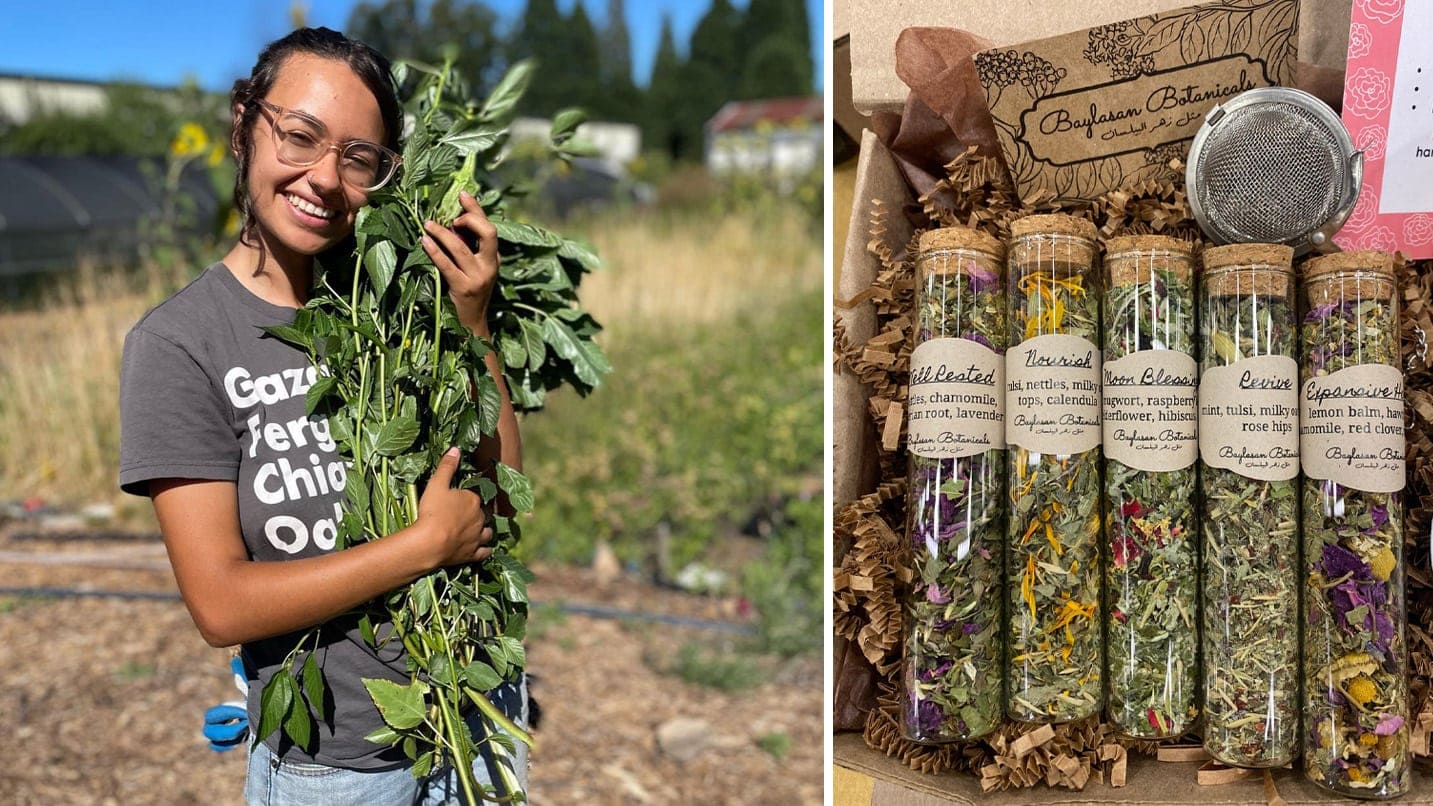
A Syrian Herbalist and Cultural Worker
Previously a counselor for system-impacted youth, farmer and herbalist Iman Labanieh of Baylasan Botanicals views her work as care, cultural and anti-oppression work. It’s a connection to her Syrian lineage even though she doesn’t have access to her homeland. “Growing herbs and foods that my people and ancestors have eaten is very special and healing,” she says.
In March 2020, Labanieh arrived in Oregon the day before shelter in place went into effect. After completing a farm internship, she started her farm as a 100-foot stretch of herbs in Gales Creek before relocating to Unity Farm in Northeast Portland. The name Baylasan refers to the Arabic word for “elderberry.”
Today, like her neighbor Mariquita Medicinals, Labanieh grows medicinal herbs and flowers for apothecary and wellness products. Two specialties are the immune-boosting, spicy-vinegary fire cider syrup, and vegetables like molokhia (also known as jute mellow), a leafy green prevalent across Southwest Asian and North African cuisines. You’ll find Baylasan Botanicals online and at Come Thru, Jerusalem Rose Market, SWANA Souk, and Rocky Butte and King farmers markets.
Labanieh says we all have a relationship with plant medicine even if we don’t realize it. Herbalism is simply the practice of using herbs, whether it is to treat a specific illness or on an everyday basis through the teas, spices and flowers we enjoy. To help more people engage meaningfully with plants, Baylasan Botanicals offers volunteer opportunities and classes with topics like making fire cider. You can also attend plant walks focused on identifying plants and how to use them as plant medicine. See the website for current offerings.

